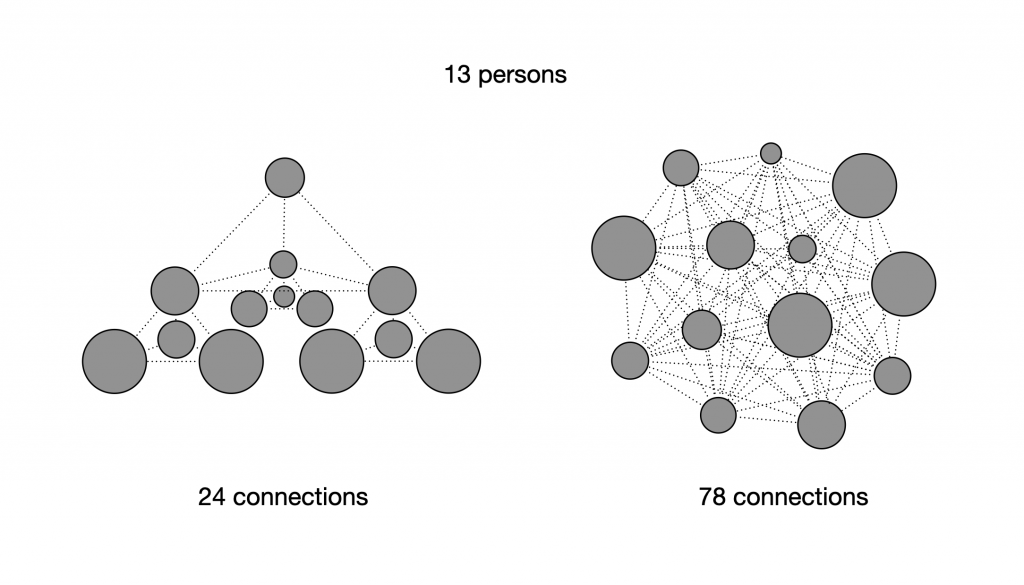When I am safe among people I am protected by rules, principles, culture – and in the last sense – by another person.
Have you ever had someone stand up for you? An encouraging feeling, isn’t it?
When I am safe among people I am protected by rules, principles, culture – and in the last sense – by another person.
Have you ever had someone stand up for you? An encouraging feeling, isn’t it?
I can focus more fully on the task when I have been acknowledged as an equal. This is what so-called check-ins are for.
When building an environment for collaboration, this kind of metaphorical thinking can be helpful.
If you have “been yourself” and I have punished you in any way, next time you might think twice about showing this side …
And my choice is: do I want to live in a humanity (or neighbourhood) that:
a) seems like one I like, with lots of hidden aspects
b) shows itself as it is
?
The price of b) is discomfort while staying curious and might be a muscle I haven’t really exercised much yet … and so helpful are “supportive structures” like principles. Now, if principles are forced upon me, I will want to go away. So we wanna introduce them as an opt-in: “in this place the following principles apply … please weigh them carefully … should you find them acceptable, you are welcome to enter”
Good places to exercise are principle-based events like Burning Man or other “burner events”. Easiest, quickest and cheapest is probably a conference where the venue is prepared and hosted for the participant to bring the programming, i.e. “unconferences” or “open space conferences”.
Think of a carpenter who has lost one leg in an accident years ago. Clearly, he has a deficiency. However, he also has a skill. […] That information can literally build our community.
To be powerful, a community must have people who are producers.
– from “Building Communities from the Inside Out” by John P. Kretzmann and John L. McKnight.
For example the home-care services for elderly; they’ll clean, they’ll go for grocerys, they’ll give medicines –– and then they leave. We want also social time to count as something important! And that’s when you have to get up to the higher levels [of decision-making] to have that written in, cause then it works.
– Amelia Adamo in Navid Modiri’s podcast “How can we …?” (only in Swedish)
The things that people decide to do for themselves, they are much more likely to take responsibility for. And the things where I’m told to do it – well if I didn’t decide that it’s worth doing, I’m very, very much less invested in it working out well.
So if [you’re my boss and] I come to you and I say: “I really think we should open a new department”, and you say: “Well, if you think that that’s a good idea then you should do it” –– now I am on my metal to make sure that the way I do it fully justifies the argument I made for it.
– Margaret Heffernan in the latest Leadermorphosis podcast
If an organism is made up of people, you have all of the individual intelligences plus what’s possible between any two people – or three, or four.
To the extent the above is true, the fully intelligent organism is one where all “cells” are in unity.
This calls for every cell to know what to aim for and what to yield to at any given crossroads.
Example of what to aim for by home-care company Buurtzorg: “client’s independence”
Example of how to prioritise in the exceptionally thin manual for new employees by American retailer Nordstrom: “Use your best judgement in all situations. There will be no other rules.”

As a living being, you are intelligent. What you percieve, I believe you percieve for a reason.
I like the image of a puzzle, for which we all carry pieces. Maybe sometimes none of us knows why something is on our mind. And then maybe we mention it anyway, and it awakens something in another – and maybe they have another piece?
If you are interested in the evolution of self-organisation, in this podcast episode are fresh stories from just a few weeks ago. To enjoy, you might wanna be familiar with Burning Man on some level.
Background:
Burning Man has been one of the more self-organised happenings. This year because of covid, there was no BM. Now people went out anyway – some 11000 at the most – and you had an even more self-organised happening aligned with the values of the original event.
Many nice nuances in this episode for the nerd.
Every ‘yes’ to make the temple happen we were going to say yes to. And that’s when magic really started to happen.
– Monera Mason, working on the temple at this “Renegade Burn”
If you press play below you’ll hear another quote from Monera.